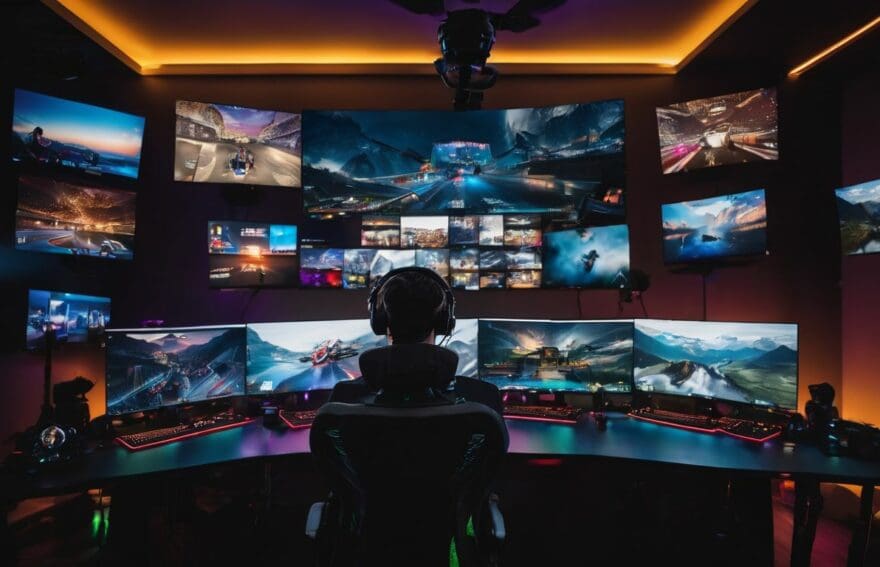From Gamer to Professional: Making the Leap into Esports

Updated On: November 08, 2025 by James Connolly
Many of us harbour the dream of turning a fervent gaming hobby into a viable career, yet often find ourselves at sixes and sevens about where to begin. You’re not alone—indeed, who hasn’t felt the pinch of uncertainty? It’s particularly relatable when you consider tales like Jann Mardenborough’s, who impressively shifted from gaming’s virtual circuits to the palpable adrenaline of actual racecourses.
Our forthcoming article demystifies this journey with hands-on advice for keen gamers eager to navigate their way into the esports industry. Intrigued about carving your niche in this exhilarating world? Keep your eyes peeled for our guide brimming with insights!
The Growth of Esports
Esports has rapidly grown from a casual hobby into a professional industry, allowing small-town gamers to pursue their passion on a global stage. The rise of competitive gaming has opened up new career opportunities and transformed the way we view video game competitions.
From small town gamers to professionals
In our journey from small town gamers to becoming professionals, we’ve seen firsthand that the world of esports is one where dreams really can come true. Take Jann Mardenborough for example; he went from playing Gran Turismo in his bedroom to winning at the academy and eventually becoming a professional racing driver.
His story isn’t just a one-off tale; it symbolises the real-life mirroring that’s happening within esports as many of us are transitioning from amateur players to recognised pros.
We understand that consistent practice and dedication are pivotal for anyone looking to make this leap. Whether you’re honing your skills alone or with a team, mastering game strategies, or building an online presence through platforms like Twitch and TikTok – every action gets you closer to your goal.
Opportunities keep growing as more gaming firms scout for talent eager to embark on professional gaming careers, making room not only for competitors but also creators and strategists who shape the competitive gaming culture behind the scenes.
With career possibilities expanding beyond what was imaginable years ago, it’s crucial we explore all avenues within esports—from participating in video game competitions to engaging with new tech advancements such as web3 gaming.
Career Opportunities in Esports
Professional gamers, supporting roles, and the rise of tech and web3 gaming present a wide range of career opportunities for those looking to make a leap into the world of esports.
Read more to explore the exciting possibilities in this fast-growing industry.
Professional gamers
Professional gamers are highly skilled individuals who have honed their gaming abilities to a competitive level. These individuals earn a living by participating in esports tournaments, securing sponsorships, and streaming their gameplay.
Consistency and dedication are essential for those looking to transition from amateur gaming to becoming professional players. With the rise of esports, opportunities abound for passionate gamers to turn their love for gaming into a rewarding career.
Gaming firms actively seek out enthusiastic gamers with strong potential in the industry. The path to becoming a professional gamer involves putting in the work to develop technical skills, understanding game strategies, and collaborating effectively within teams.
Supporting roles
Gaming firms seek enthusiastic gamers and esports experts to fill crucial supporting roles within the industry. Opportunities include coaching, team management, event organisation, and content creation for gaming platforms.
These roles provide essential support for professional gamers and contribute to the overall success of esports teams and events.
Tech and web3 gaming have opened up new avenues for supporting roles in areas such as game development, virtual reality (VR) design, and blockchain technology integration within gaming platforms.
Tech and web3 gaming
Transitioning from traditional gaming to the cutting-edge world of web3 gaming presents exciting opportunities for passionate gamers. With the rise of blockchain technology, NFTs, and decentralised platforms, web3 gaming is revolutionising the esports industry.
This innovative approach allows players to truly own in-game assets and participate in play-to-earn models, providing new streams of income for gamers.
The integration of tech and web3 elements into esports not only offers a fresh gaming experience but also opens doors for novice gamers to enter the professional scene. The transparent nature of blockchain technology also enhances trust between players and game developers, ensuring fair competition and authentic ownership within virtual worlds.
How to Make the Leap
To make the leap from amateur gamer to esports professional, it’s important to focus on honing your skills and getting noticed in the gaming community. Collaborating with other gamers and considering migration to web3 gaming platforms can also provide new opportunities for growth in the esports industry.
Tips for getting noticed
- Create engaging and unique content on streaming platforms to attract a loyal following and gain recognition from esports organisations.
- Network with other gamers, join gaming communities, participate in tournaments, and build a strong online presence to increase visibility within the industry.
- Seek opportunities to compete in local and regional esports events to display competitive prowess and demonstrate dedication to the profession.
Collaboration and migration to web3 gaming
Esports is continuously evolving, and the migration to web3 gaming presents exciting opportunities for both gamers and industry professionals. Collaboration becomes vital as developers, gamers, and tech experts work together to explore the potential of blockchain-based games.
The integration of decentralised networks and digital currencies not only offers new ways to play but also creates innovative avenues for earning through tokenised assets and unique in-game economies.
Embracing this shift requires a willingness to adapt, learn, and collaborate across various disciplines within the gaming industry.
As we transition into web3 gaming, keeping pace with technological advancements will be crucial for an esports career. Understanding blockchain technology and its application in gaming can open doors to diverse roles beyond traditional gameplay, such as game design, development, or community management.
Challenges and Opportunities
The rapid growth of esports presents unique challenges and opportunities for those looking to make the leap from gamer to professional. Web3 gaming is also on the rise, but mainstream adoption brings its own set of challenges and benefits for aspiring esports professionals.
Rapid growth and unique culture
Esports has witnessed a rapid surge in popularity, offering a unique and thriving culture for gamers to explore. The industry’s exponential growth provides exciting opportunities for aspiring professionals, with the chance to make a successful career out of their passion for gaming.
As esports evolves, it brings together a diverse community of players from all walks of life, fostering an inclusive environment where individuals can connect through their shared love for competitive gaming.
The distinctive culture within esports presents an abundance of prospects for enthusiasts looking to immerse themselves in this dynamic sector. From grassroots tournaments to global championships, the fast-paced growth and evolving landscape of esports offer endless possibilities for gamers seeking to transition into professional realms.
Challenges for web3 gaming going mainstream
Web3 gaming, whilst holding significant promise for esports professionals, presents its share of challenges as it looks to go mainstream. One such challenge is the need for infrastructure and technological advancements to support decentralised gaming platforms.
Additionally, there are concerns around scalability and user adoption due to the novel nature of web3 gaming. However, with careful development and strategic partnerships, these challenges can be surpassed.
Another obstacle lies in regulatory uncertainty surrounding web3 gaming and blockchain technology. As governing bodies scramble to keep pace with innovations in the industry, clear regulations that protect both gamers and investors are essential for widespread adoption.
Overcoming these hurdles will require collaboration between industry leaders and legislative entities to ensure a secure environment for gamers entering the web3 space.
Benefits of web3 gaming for esports professionals
As we look at the benefits of web3 gaming for esports professionals, it’s important to highlight the potential for decentralised finance (DeFi) aspects embedded within these games.
Embracing web3 gaming allows professional gamers to access a wider array of monetisation opportunities through in-game assets, leading to increased financial independence and ownership.
Furthermore, this transition opens doors for players to truly own their virtual assets, creating a new realm of transferable value that can be utilised beyond specific game environments.
Through web3 gaming, esports professionals can also tap into unique revenue streams by engaging with digital economies and participating in decentralised autonomous organisations (DAOs).
Conclusion
Transitioning from gamer to professional esports player requires dedication, skill, and strategy. The journey involves honing your gaming abilities, developing a strong online presence, and networking within the industry.
Embracing new opportunities in web3 gaming can provide a competitive edge and open doors to exciting career paths within the rapidly evolving world of esports.
FAQs
1. How can I transition from being an amateur gamer to a professional esports player?
Start by playing in web gaming opportunities and local tournaments, improve your skills with rigorous esports training, and network to find esports career paths that can guide your pro gamer journey.
2. Are there any specific steps smalltown gamers should take to enter the professional esports scene?
Smalltown gamers should focus on gaining visibility through online platforms, participate in relevant gaming tournaments, and consider relocating if necessary to access better training and professional gaming opportunities.
3. What does the day-to-day life of a pro gamer look like?
A pro gamer spends much of their time practicing their game of choice, studying strategies, participating in team trainings or individual sessions, and competing in both online and offline esports events.
4. Can anyone make a living by transitioning into the Esports profession?
Making it as a pro requires dedication beyond just enjoying games – consisting of consistent practice, understanding detailed game mechanics and participating actively within competitive scenes; only then might one secure earnings akin to those seen in traditional careers.
5. Is prior experience in gaming tournaments important for an amateur looking to go professional?
Yes! Prior tournament experience is valuable because it exposes you to high-pressure scenarios typical of an Esports environment – this real-life mirroring helps develop the mental resilience needed for making the leap from casual play into serious competition.








